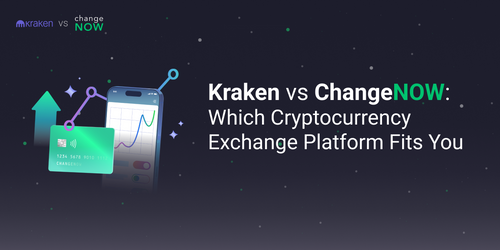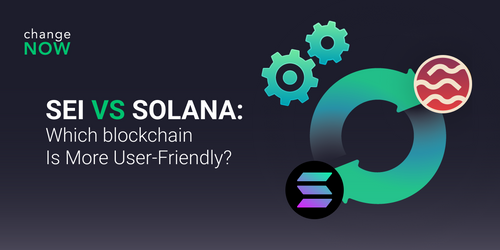Crypto Broker vs Exchange: Key Difference Explained
Learn how crypto brokers differ from exchanges| Learn their pros & cons, and which one fits your strategy best

Key takeaways
Crypto brokers provide a fixed price and handle the trade for you. They’re convenient, often support fiat deposits, and store your assets on the platform. You’ll need to create an account and complete KYC verification.
Exchange services focus on quick crypto-to-crypto swaps without holding your funds. These are non-custodial, meaning you stay in control of your wallet, and often don’t require registration for small trades.
With brokers, the platform holds your crypto until you withdraw. Exchange services send assets directly to your wallet once the swap is complete.
Difference Between Crypto Brokers and Exchanges
In the crypto world, “crypto broker” and “exchange” are often used like they mean the same thing, which can be confusing. Both let you buy and sell crypto, but they diverge in operation, control, and overall user experience. Let’s break down the difference.
What is a crypto broker?
A crypto broker is a service that makes it easy to buy or sell digital assets without dealing with other traders directly. The broker offers you a price, usually it includes a small markup and completes the trade on your behalf.
The broker does all the behind-the-scenes work. For example finding liquidity, managing risk, and processing the transaction quickly and smoothly. You don’t have to deal with complex tools like order books or trade matching, because everything happens in just a few clicks.
This kind of platform is perfect for people who prefer simplicity and convenience over active market control.
How does a crypto broker work?
A crypto broker lets you buy or sell digital assets directly through the platform. There is no need to trade with other users or deal with complex charts. Here are steps to use crypto broker:
Step 1. Create an account and verify your ID
Step 2. Deposit money in fiat or crypto
Step 3. Choose what you want to buy or sell — the platform shows you a fixed price that already includes a small fee
Step 4. Confirm the deal — the broker completes the trade using its liquidity sources
Step 5. Your crypto appears in your account or wallet
What is an exchange?
Crypto exchange services work a bit differently from traditional trading platforms. Rather than hosting a full marketplace with bids and offers, these services focus on quick, direct crypto swaps between currencies.
All you need to do is choose the coins you want to swap, for example, Bitcoin to Ethereum, provide your wallet address, and the platform will take care of the rest, finding the best available rate and completing the transaction automatically. Platforms like ChangeNOW, Changelly, and SimpleSwap specialize in this model. They’re non-custodial platforms and they don’t hold your funds.
Example: You have some Ethereum in a wallet, but what you really need is Solana for a transaction on that blockchain. The fastest way is to head over to ChangeNOW. You pick "Ethereum" to "Solana," punch in your own Solana wallet address, and they spit out a quote and a one-time deposit address. You send your ETH to the adress, wait a couple of minutes, and the SOL is right there in your wallet. Your crypto never left your custody.
How Exchange Services Work
Step 1. Choose the pair you want to exchange (for example BTC → USDT)
Step 2. This is where you’ll receive the converted funds
Step 3. Send your coins to the provided address. The platform completes the crypto swap and transfers the new asset to your wallet
Let’s take a closer look at the advantages and drawbacks of the two types of platforms in the crypto space
Pros of Crypto Brokers
- Crypto brokers make buying and selling digital assets clear and easy. There’s no need to navigate complex order books or trading charts because everything happens in just a few clicks
- Most trades are completed within seconds. Since brokers rely on their own liquidity or connect to partner exchanges, transactions are quick and rarely experience delays
- You always know what you’re paying for. The quoted price already includes all fees and spreads, giving you full transparency before confirming the trade
- Brokers make it simple to move between fiat and crypto. Most support debit and credit cards, bank transfers or even mobile payment apps, so adding funds or cashing out feels familiar and effortless
- Crypto brokers are built for simplicity. They’re perfect for beginners or casual users who value speed and ease over complex market analytics or professional trading tools
Cons of crypto broker
- When you keep your crypto on a broker’s platform, you don’t actually control your private keys. Even if the platform has strong security, storing everything in one place always carries some risk
- If a broker runs into financial trouble or legal issues, your money might get stuck on the platform. In such cases, withdrawals can take a long time, and it’s not always clear if users will get their assets back in full.
- Most brokers ask for ID verification to follow government rules. While it helps prevent scams and fraud, many people find it frustrating, especially those who want to stay anonymous or protect their personal data.
- Some brokers keep your assets in internal wallets until you manually move them. Withdrawals can take extra time, especially if the platform needs to confirm your identity again or is handling high traffic.
Pros of Exchange Services
- Quick execution makes these platforms perfect for users who value speed. Transactions are processed automatically, often taking just a few minutes from start to finish
- Non-custodial design means you stay in control of your funds. The service only processes your swap and it never holds your assets
- No registration or KYC is required, so you can exchange crypto instantly without sharing personal data or creating an account
- Transparent pricing helps you see the exact rate and fee before confirming the swap
- Simplicity of use allows even beginners to swap coins quickly and easily
Cons of Exchange Services
- Limited liquidity can have an impact on rates on large transactions, especially when swapping less common tokens
- If the platform doesn't support many assets, you might not find the pair you’re looking for — this isn’t usually a problem on larger platforms
- Price differences can appear because instant services rely on aggregated data and external liquidity providers
- Lack of advanced tools makes it difficult for traders to analyze markets or plan complex strategies within the service
Comparison
| Feature | Crypto Broker Platform | Exchange Service (Instant Swap) |
|---|---|---|
| Account setup | Requires account creation and KYC | Usually no registration or KYC for small amounts |
| Custody | Custodial — platform holds funds | Non-custodial — user keeps private keys |
| Trading model | Broker quotes fixed price, executes internally or via liquidity partners | Instant conversion between assets at current market rate, often aggregated from multiple sources |
| Speed | Fast, depends on broker liquidity | Very fast — typically minutes |
| Liquidity | High — internal pools + partner liquidity | Moderate — depends on provider |
| Tools & analytics | Charts, APIs, order types, portfolio tracking | Minimal — focused on swaps only |
Conclusion
In the end, both crypto broker and exchange services have the same purpose: making it possible for users to move value within the crypto ecosystem. The difference is how they do it and what kind of experience they’re built to provide. If you’re looking for a simple way to buy or sell crypto, a crypto broker platform offers a straightforward option. It provides a fixed price, processes the transaction, and adds the purchased assets to your account. Most brokers support standard payment methods like bank cards or transfers, which makes getting started relatively easy. However, since the platform holds your funds, you depend on its security and operational stability.
On the other hand, if your goal is to exchange one cryptocurrency for another quickly, without registration, and without giving up custody of your funds - services like ChangeNOW or SimpleSwap are built for that use case. They’re fast, easy to use, and don’t require reg. But they come with their own trade-offs: a more limited set of supported assets, no advanced trading features, and potentially less favorable rates for large or rare swaps.




